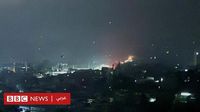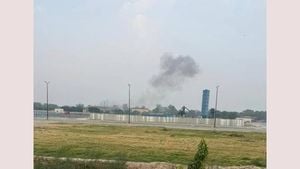On May 7, 2025, tensions between India and Pakistan escalated dramatically as both nations exchanged military strikes across the Line of Control in the disputed region of Kashmir. The Indian army reported that it targeted what it described as "terrorist infrastructure" in Pakistan, a response to an earlier attack in Indian-administered Kashmir that left 26 people dead on April 22, 2025. This latest round of conflict has led to casualties on both sides, raising fears of a broader military confrontation between the two nuclear-armed neighbors.
The Indian military announced that it conducted precise strikes against multiple locations in Pakistan, asserting that these operations were aimed at dismantling terrorist camps responsible for attacks on Indian soil. According to an official statement, "Indian forces launched an operation to strike terrorist hideouts in Pakistan and Kashmir where the planning and leadership of terrorist attacks against India takes place." The Indian government emphasized that these actions were calculated and intended to avoid escalation, stating, "Our operations were targeted and deliberate in their nature. Our movements were calculated and we do not intend to expand on any targeting."
In response, the Pakistani army condemned the Indian strikes, claiming that they targeted civilian areas rather than military installations. Pakistani Defense Minister Khawaja Asif reported that at least three civilians, including a child, were killed in the strikes. He characterized the Indian attacks as a "cowardly response" and insisted that Pakistan would retaliate. Asif stated, "We have the full right to respond forcefully to military aggression from India." The Pakistani army also claimed to have shot down two Indian aircraft during the conflict, a claim that has not been independently verified.
According to reports from Reuters, the Pakistani military confirmed that eight people were killed and 35 injured due to the Indian shelling. A Pakistani official announced a state of emergency in Punjab, underscoring the severity of the situation. The escalating violence has led to a significant closure of airspace over major cities like Lahore and Karachi, disrupting air travel and causing panic among residents.
Eyewitness accounts from Muzaffarabad, the capital of Pakistan-administered Kashmir, described widespread chaos following the explosions. One local resident, Muhammad Waheed, recounted the panic as he and others fled their homes, stating, "I was sleeping when the first explosion shook my house. I rushed into the streets to see others doing the same. Before we could understand what was happening, more missiles fell, increasing the chaos." Reports indicate that many were injured and required hospitalization.
The current hostilities stem from a previous attack on Indian tourists in Kashmir last month, which India attributed to militants based in Pakistan. The Indian government has consistently accused Pakistan of harboring terrorists and has vowed to respond to such threats decisively. In contrast, Pakistan denies any involvement in the attack and has claimed to possess intelligence indicating that India is planning further military actions.
The United Nations has expressed concern over the escalating conflict, with Secretary-General Antonio Guterres calling for maximum restraint from both sides. The UN has urged the international community to intervene to prevent a full-scale military confrontation, emphasizing that the world cannot afford another military escalation between these two nations.
In Washington, U.S. Secretary of State Marco Rubio stated that he is closely monitoring the situation and has urged both India and Pakistan to maintain open lines of communication to de-escalate tensions. The U.S. administration has been in contact with both countries, advocating for a peaceful resolution to the conflict.
As the situation continues to unfold, both nations remain on high alert, with military operations ongoing along the Line of Control. The potential for further violence looms large, and the international community watches with bated breath as the conflict threatens to spiral out of control.
In summary, the recent military exchanges between India and Pakistan are a stark reminder of the fragile peace in the region. With both nations accusing each other of aggression, the prospect of a diplomatic resolution seems increasingly distant. As civilians bear the brunt of these hostilities, the urgent need for dialogue and restraint becomes ever more apparent.





